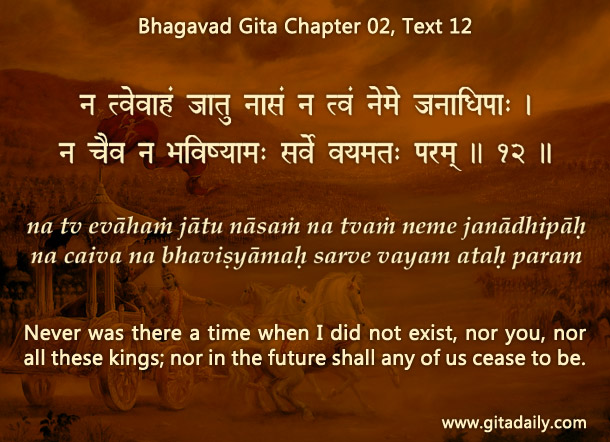Some spiritualists hold that our sense of personhood (“I am a person”) is just a stage in the evolution of consciousness – when consciousness evolves towards enlightenment, it merges into impersonal oneness.
The Bhagavad-gita acknowledges that consciousness does exist eternally as the impersonal Brahman effulgence. And the Gita asserts that personal consciousness continues to be personal eternally. It (02.12) indicates that Arjuna and Krishna will continue to exist in the future. Their eternal existence implies that personality isn’t lost after attaining enlightenment. How is this implied? Krishna is eternally enlightened, being the transcendental absolute (07.26) – if he, the infinite consciousness, exists as a person now, that’s how he will exist eternally. And Arjuna became enlightened on hearing the Gita (18.73). If he too will continue to exist after enlightenment, that means his individual personality is also eternal.
Indeed, Gita wisdom asserts that infinite consciousness, Krishna, is a person – innately, eternally, transcendentally (15.19). We all are souls, his eternal parts. As he is a person, so are we.
Like the ill-informed spiritualists mentioned earlier, some materialists too depersonalize consciousness. For example, abortion advocates claim that the embryo is not intrinsically a person; it becomes a person at a particular stage of manifestation of consciousness. At which stage? Second month of pregnancy? Fourth month? Sixth month? Science can’t answer because it can’t measure consciousness itself; it can only measure brain activity level. How, then, do abortionists determine the answer? Often by political legislation; wherever the pro-abortion lobby becomes stronger, there, the embryo “becomes” a person later. Extending such expedience to extremes, some materialists argue that even a born baby needn’t be considered a person; it too can be aborted.
Such are the far-reaching consequences if we indiscriminately depersonalize consciousness. Thankfully, Gita wisdom stands forever ready to counter spurious arguments that depersonalize consciousness.
To know more about this verse, please click on the image
Explanation of article:
Podcast:
Download by “right-click and save”
Talk it over:
- Is personhood lost at enlightenment?
- What’s wrong with arguing that the embryo is not intrinsically a person?
- Can you think of instances when you tended to depersonalize those who opposed your ideas?


Leave A Comment